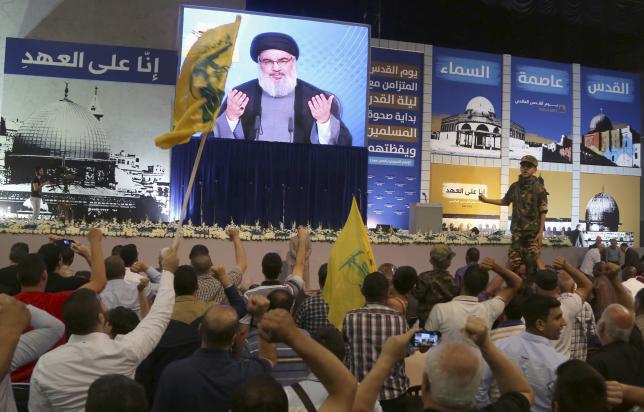
In his first public remarks since the agreement was reached this month in Vienna, Nasrallah said he was sure Tehran would confound critics who say it would end support to Hezbollah.
"We deal with every trust and complete assurance over this Nasrallah said in ceremony to honor sons and daughters of fallen Hezbollah fighters.
"Iran’s relationship with its allies is based on ideological grounds and come before the political interests," Nasrallah said.
U.S. sanctions against three Hezbollah military leaders whom Washington said were involved in operations in Syria would have no impact on the group, Nasrallah said.
"We have no investment accounts..these measures will not change things either way," Nasrallah said.
The three leaders – Mustafa Badr Al Din, Ibrahim Aqil, and Fu’ad Shukr – were named for their role in coordinating or participating in the group’s support for Assad’s government in Syria’s civil war, the U.S Treasury said.
It also included a businessman in Lebanon who was sanctioned for procuring weapons for Hezbollah and shipping them to Syria.
The new sanctions following the nuclear deal and Washington’s continued designation of Hezbollah as a terrorist group showed that U.S. policies have not changed toward it, he said.
"The United States is the Great Satan before and after the deal," he said.
Nasrallah said the targeting of Lebanese businessmen was meant to undermine Lebanon’s economy and said monetary authorities should not cave into U.S. Treasury efforts to blacklist local businessmen.
The Treasury said it had taken action in June against Hezbollah front companies.
U.S. President Barack Obama and Secretary of State John Kerry have said they are troubled by support from Iran for regional proxy groups such as Hezbollah.
Nasrallah said his group was proud of Tehran’s financial backing, which allowed it to stand up to Israel and U.S. policies in the region.
"The support we get from Iran is enough," Nasrallah said.
Hezbollah’s support has been crucial to Syria’s President Bashar al-Assad in the four-year-long Syrian conflict.
(Reporting by Suleiman Al-Khalidi; Editing by Angus MacSwan)



